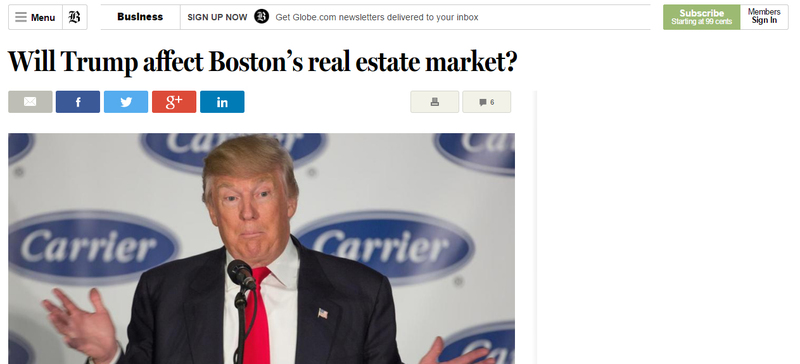Will Trump affect Boston’s real estate market?
Donald Trump won the White House in part on a promise to rewrite the rules of global trade, stemming the flow of foreigners coming to the United States and blue-collar jobs flowing out.
But he seems unlikely to change one piece of that trade that is helping to substantially remake Boston: overseas investment in US real estate.
Billions of dollars in global capital have sluiced into Boston’s real estate market in recent years. That money has fueled blue-collar construction jobs of the sort the president-elect promises to create by the millions. Yet it has also financed many of the city’s newest luxury towers that, to some, are symbols of the deepening inequality behind the country’s economic discontent.
Trump, though, has deep experience with foreign capital on real estate ventures. He has worked with many international banks and investors on projects in the United States and overseas. His son-in-law, Jared Kushner, raised $50 million for a Trump-branded residential tower he’s building in Jersey City, N.J., through a visa program that provides overseas investors — often wealthy Chinese — a green card in exchange for $500,000 in investment.
Jared Kushner (left), son in-law of President-elect Donald Trump, walked with Trump's chief strategist Steve Bannon at Indianapolis International Airport on Thursday.
The president-elect’s handling of his international real estate holdings has come under increased scrutiny since the election, especially amid reports that suggested he discussed them with foreign leaders on congratulatory phone calls and hosted foreign business partners at Trump Tower. On Wednesday, Trump announced on Twitter he would be “leaving my great business in order to fully focus on running the country,” but details on how he would do that were not yet clear.
His personal dealings aside, Trump’s background suggests he is unlikely to block overseas capital from US markets, said Mike Rubin, a real estate lawyer at Posternak Blankstein & Lund in Boston. While a Hillary Clinton administration would have probably been status-quo for commercial real estate, Rubin said, many in the industry see Trump as a sympathetic soul who will only make their job easier.
“He’s a developer by trade,” Rubin said. “The real estate community is breathing a sigh of relief that someone who understands their business is in the White House.”
In Boston, foreign investors play a growing role in the ongoing real estate boom, either by financing developments or buying properties outright. Since the beginning of 2015, international investors have spent at least $5.1 billion buying office towers, apartment buildings, and hotels, according to the real estate firm Savills Studley, and hundreds of millions of dollars more financing construction, such as the Pier 4 condo project in the Seaport District.
Barring an economic crash or a full-blown trade war with China — which may yet happen if Trump carries out threats he made during the campaign — that flow of cash is likely to continue in the years to come. That’s largely because the United States remains a more stable, prosperous investment market than most other countries, said Frank Petz, managing director of capital markets at JLL, a real estate firm. While international investment in London has declined since the United Kingdom’s Brexit vote, he doesn’t see a parallel here.
“What else are people going to do with their money?” Petz said. “The US remains, by far, the best place to invest. It’s the safest, most secure market, with the greatest long-term growth potential.”
Foreign buyers are also scooping up units in many of the new luxury residential buildings in Boston, such as Millennium Tower, either as an investment or as homes for themselves or children attending college here. And that trend is likely to continue, said real estate executives, unless Trump does something unforeseen, such as cracking down on foreign student visas.
Moreover, any anti-immigrant sentiment triggered by Trump’s election isn’t likely to dissuade such buyers. A survey by Juwai.com, a major international real estate website aimed at Chinese buyers, found that 36 percent of those surveyed believed investment would decline under Trump. Most expect the situation to continue as is.
“I wouldn’t say the Trump win is as big a shock for the average Chinese property buyer as it might be for some in Boston,” Juwai chief executive Charles Pittar said in an e-mail. “Most Chinese think of Trump as just another president.”
That’s not to say there won’t be some pause as international investors assess the tax and trade policies of the Trump administration, said James Heffernan, an attorney who represents international real estate investors for the law firm Rich May. At this point, it’s hard to suss out campaign rhetoric from reality.
“There’s some anxiety, no doubt,” Heffernan said. “We just don’t know which way he’s going to go.”
There could be impacts from broader economic policies. Higher interest rates could dampen investment. Tariffs on imports could prompt China to restrict its wealthy residents from investing overseas. But Heffernan and other observers pointed to Trump’s background as a high-end developer familiar with international business deals as a sign he won’t intentionally create barriers for those who want to put money to work in the United States.
Meanwhile, the foreign investor visa program that Trump’s son-in-law used to finance his project is due to expire Dec. 9. Known as the EB-5 Immigrant Investor Program, it has drawn opposition from many quarters, including criticism that it’s too often used to finance projects in prosperous neighborhoods instead of places in need of development.
In Boston, developers of the Pierce building, under construction in the Fenway — where condos start at about $1 million — raised $50 million through the EB-5 program. Several other local projects have tapped it, as well.
Critics in Congress have long been angling to amend the program when it comes up for renewal, though it’s unclear how Trump’s election will influence the outcome. He did not take a position on EB-5 visas as a candidate.
“We know immigration will be getting attention,” said Doug Hauer, an attorney at Mintz Levin who specializes in EB-5. “But there’s even a question mark around what that means.”
Mentions
States
- New Jersey
Videos





Subscribe for News
Site Digest
Join Professionals on EB5Projects.com →
Securities Disclaimer
This website is for informational purposes only and does not constitute an offer or solicitation to sell shares or securities. Any such offer or solicitation will be made only by means of an investment's confidential Offering Memorandum and in accordance with the terms of all applicable securities and other laws. This website does not constitute or form part of, and should not be construed as, any offer for sale or subscription of, or any invitation to offer to buy or subscribe for, any securities, nor should it or any part of it form the basis of, or be relied on in any connection with, any contract or commitment whatsoever. EB5Projects.com LLC and its affiliates expressly disclaim any and all responsibility for any direct or consequential loss or damage of any kind whatsoever arising directly or indirectly from: (i) reliance on any information contained in the website, (ii) any error, omission or inaccuracy in any such information or (iii) any action resulting therefrom.




